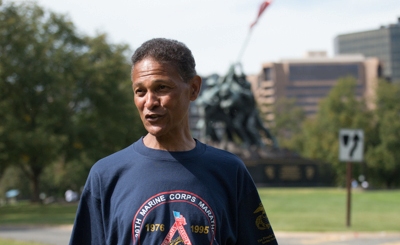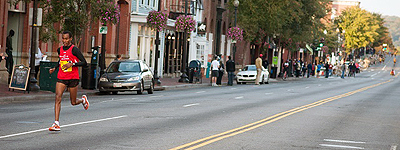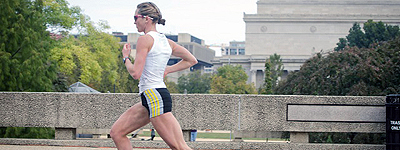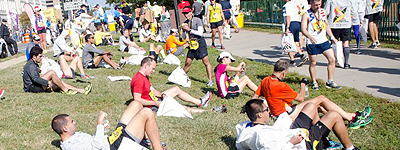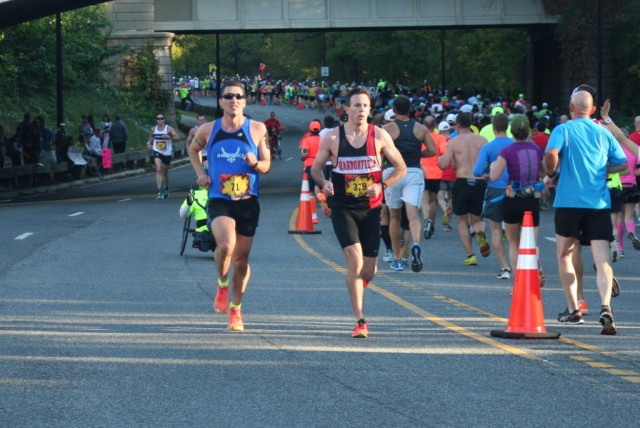
The high point in Zak Miller’s running career came a month ago at the Marine Corps Marathon.
The 28-year old ran his best marathon to date, finishing in 2:36:02 to place 14th overall in a field of 19,791 runners.
It had been a decade earlier when he had last experienced that kind of visceral thrill, winning his Group II race at the indoor 3,200-meter championships while competing with Haddonfield Memorial High School in New Jersey under legendary coach Nick Baker.
And it felt good.
But in truth, that day on the roads, running just his second marathon, had been far beyond what he ever thought he could do individually. Emotionally, it had been a long road to just get back to this point, to have this kind of success in running again.
Just four years earlier, at the low point in his life, he had found himself in jail.
“I was wondering how I went from being recruited by some schools and having decent test scores,” Miller said, “to now, ‘Why am I sitting in jail in Camden, N.J.? How did that happen?’”
# # #
After graduating from Haddonfield, he arrived at Kutztown University as a talented freshman runner for the Golden Bears.
But that had been long ago. Within a few years, he left school, quitting the track team, and moved to Philadelphia – a stone’s throw away from his home in Haddonfield, but just close enough to hold on to old habits.
He had picked up a job at a meat processing plant in North Philadelphia, managing ex-cons in the wean hours of the night. He filed paperwork, watched over employees, and came home at night exhausted.
He didn’t really have any direction. He didn’t have a plan. He had been coasting.
But then that fateful night, one small traffic stop led to his demise.
And now he was in jail, having been arrested after being stopped by police driving on a suspended license, the result of which, he said, of having not paid parking tickets.
Small things added up. While it didn’t mark a life spun out of control from drugs or alcohol, it had been a sobering moment. His life was certainly spinning in some way.
He had ballooned from 135 pounds at the start of his freshman year to 205 pounds at the age of 24. He had stopped running entirely and had formed unhealthy eating habits.
“I don’t think I had any focus,” Miller said. “I didn’t like the job. I wasn’t running and I didn’t have that outlet. I wasn’t doing anything athletically. I don’t know if I knew what I wanted.”
So he sat in that jail cell long and hard that night thinking about the future, thinking about his life, about where it was heading and what he wanted to do with it.
# # #
Miller’s father, Bryan, had encouraged him to start running at an early age.
“He told me my high school coach [Nick Baker] was kind of a legend in New Jersey,” Miller said.
And so he did, at the time becoming part of a program which had won eight New Jersey state championships – currently, the team has 13 overall, winning five straight from 2006-10.
Miller saw his most individual success in indoors, where he was a standout two-miler.
In his state championship group race, he fell behind early, going back to as far as 24th place through two laps. By the finish, though, he had gapped the rest of the field by 50 meters, finishing in 10:11.
“I was very good at knowing where I needed to be and controlling my pace and running under control,” Miller said.
Beyond the track, though, there was another benefit. Miller started to believe in what running brought to his life. He began to soak in that energy and earned a job at the Haddonfield Running Company selling shoes and talking to customers.
When his high school career finally ended, he was headed in the right direction. His career had promise.
# # #
Ultimately, things didn’t work out at Kutztown. Miller credits his time at Kutztown to being naïve and young, like countless other college-aged kids.
“It’s definitely a disappointment,” he said. “It was me being immature, me being 19, 20 years old. I mean, it would have been fun to see what I would have done if I had my head on right, trained right, and ate right, if my coach and I got along. But that’s my own fault.”
Following his exit from college, the immaturity lasted for a few years.
“The shenanigans I pulled and the job I had in Philly, all that factored in,” he said. “I just wasn’t a happy person for years.”
# # #
Following his arrest, it didn’t take long for Miller to zap out of his funk. He decided on a new plan, one that would see himself moving away from the place that he called home, away from the people who had acted, in small parts, as enablers.
Miller applied to a job at Pacers in Silver Spring and moved in with a cousin who lived in Calvert County, Md.
A cousin encouraged him to sign up for a 5K, the Haddonfield Adrenaline 5K, which he did. Still overweight and above 200 pounds, Miller won the race in 16:50.
Weeks later, Miller decided to double down. He signed up for the Philadelphia Marathon, a notion, he said, that was supported by his mother, who had cheered at nearly every one of his races.
Needing to lose weight, Miller started to eat right, incorporating vegetables and protein into his diet. His first true training week saw him run 40 miles. He was training by himself.
“It’s hard to get motivated and get out the door,” he said. “Any runner will say, the hardest step is stepping out the door. So, if you have a shi*** run, having to work through it on your own and not having a distraction of being out there with somebody or anybody else to pace with, it’s kind of maddening. But it’s a strength on the other side. You’re the only one out there working through it yourself.”
At his peak, he had hit 88 miles, and by then, he had lost 30 pounds. Miller went into the race at 175 pounds. More importantly, he had set a goal for himself: 2:42 or bust.
The 27-year-old ran a 2:41:50 in his debut.
He was back.
# # #
Just weeks after the Marine Corps Marathon, Miller is chowing down on barbecue at Kangaroo Boxing Club in Columbia Heights, looking back on his last few years.
After his marathon finish, a local running team had approached him about potentially joining their club.
He’s now working at the Georgetown Running Company.
And more importantly, he’s just a few credits shy of picking up his bachelor’s degree in psychology. He’s taken classes at the University of Maryland and others at a local community college, looking to finalize his degree.
He might even apply for dual-citizenship – his grandmother was Scottish – so he can travel and study some more.
Running will continue to be in his life, regardless of where he goes.
He even has thought about coaching. He’s thought about guiding others who struggle to help release it through running.
“I’m much better person when I’m running then when I’m not,” he said. “I sleep better. I feel better. If you have a shi*** day and go out for a run, you usually feel a lot better afterwards. And that’s how I view it. It’s fun. And it wasn’t fun for a long time. It was a job. In college, it was a job. And now I’m enjoying it again.”
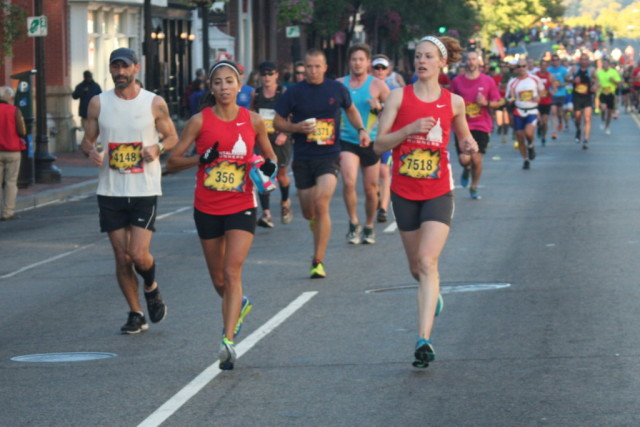
Some Run Washington featured marathoners had great days Sunday at the Marine Corps Marathon, but many missed personal time goals fighting strong headwinds and battling sinus issues. Still, each said they loved the experience of seeing the crowds and crossing the finish line.
See below to check on how each runner fared.
Jenn Pellegrino
Jenn Pellegrino had a 26.2 mile birthday party at Sunday’s Marine Corps Marathon.
“I had a sign on my back that said celebrating my 30th birthday,” she said. “All along the course people were wishing me a happy birthday. It felt like a big birthday party, can’t think of a better way to celebrate that next decade.”
Pellegrino finished the race in about 4:40 and said she “had a blast.” She’s run three marathons in the past month, so went out with the intention to take it easy and just enjoy the atmosphere.
“The Marine Corps is so special, I never try to push it,” she said.
Though she has nothing on the calender officially until the Big Sur Marathon in April, she said she’ll likely sign up for a couple other marathons before the end of the year.
“That’s to be determined, but I usually don’t go more than a few weeks without running a race,” she said.
Breanna Gawrys
Breanna Gawrys was disappointed with her race time, but enjoyed the atmosphere on the course, with crowd support and inspirational reminders of those who had died in war.
“Overall it wasn’t quite what I wanted as far as time, but it started off really great for the first 10 miles. I was staying with 3:25 pace group, but I think I went out a little too aggressively. I didn’t feel too great after the half,” she said.
While she thought having more free time to train would leave her better prepared than last year’s race, she ended up finishing in 3:45, slower than her previous year’s time.
“I felt more ready, but I hadn’t really done fast long run training. I did my long runs at comfortable pace, and one night of speed work a week. I think I need to do a little bit more tempo,” she said.
She ran in a Team Red, White and Blue t-shirt and said the crowd support from members of the military made it so she couldn’t give up, even when she struggled in the second half. One of her favorite parts of the course was the Blue Mile on Hains Point, where pictures of fallen service members line the race course.
“It’s very inspiring and very touching,” she said. “Another thing that was really cool too was people racing with and pushing handicapped children and blind guys running, it’s very cool.”
She said she’ll definitely be back at the Marine Corps Marathon in 2015. In between, she’s already signed up for the Rock ‘n Roll half, but is trying to switch to the full marathon to have another shot at qualifying for Boston.
Kelly Swain
Kelly Swain finished the race in 3:00:55 – less than a minute off her goal of breaking three hours in her first marathon.
Despite that, she said she gave the race her all and is happy with her performance.
“I would say I definitely gave everything I had, left everything out there. I’m really happy about my time and my overall place,” she said.
She said she struggled a bit around mile 17, but got a second wind through mile 22. The last two miles, with little crowd support along the highway, were “definitely rough.”
She said she faced a lot of ups and downs throughout the race – both emotionally and physically – and while no second marathon is on her calender right now, her coach encouraged her to sign up for a flatter race, she said.
On most of the course, however, Swain said she was surprised by how many people came out to cheer on runners. Some of her favorite parts of the course were just after Rock Creek Park and around the Capitol where throngs of people lined the race course.
“Usually I wouldn’t think with such a big race or such a long race there’d be so many people, but there were people everywhere, which was amazing,” she said.
With the marathon behind her, Swain can focus on her next big event: her wedding on Friday. With only a few small logistical things to take care of before then, Swain said she plans to spend most of the week just recovering.
Jon Deitchman
Jon Deitchman loved the crowd support in his first Marine Corps Marathon. His favorite parts of the course were just after Hains Point, when spectators started lining the course again, and through the festival in Crystal City.
“With the festival they had going on, it was a really fun atmosphere. By that point, you know you’re so close it’s just beating your head,” he said.
Deitchman had hoped to break four hours, but ended up finishing in about 4:35. He said started off running with friends and had a hard time moving up around other runners at the beginning. While he may have missed his goal time, he said he was ecstatic just to have the experience of crossing the finish line.
“Everything from the opening ceremonies, it was just a blast and running was fantastic. It was a beautiful day,” he said. “I didn’t go as fast as I wanted to, but that just means next time I’ll have to do a little better. But overall, the experience in itself and just finishing was all your could really want to do.”
He said he hopes to be back out at the race next year to reach his goal time.
Jonathan Ferguson
Jonathan Ferguson finished Sunday’s marathon in 2:58, blaming his missed goal of 2:50 on recovering from a cold and a strong headwind both heading over the 14th Street Bridge and heading toward the finish line.
“It was not exactly as I’d hoped,” he said. “I was holding up pretty good until I got to mile 20, then I really started to fall apart around there.”
He said his cold has made him miss a few days of training this week and he still didn’t feel 100 percent well for the race.
A highlight was getting to run with a few of his former team mates from the University of Maryland.
“We sort of missed each other at the start, but when we passed each other through Rock Creek Park, it was very fun to see them,” he said.
Anthony Garofano
Anthony Garofano finished in 4:47, missing his goal to finish under four hours. He too was fighting off a cold and taking cold medicine, so said he was overall “pretty satisfied” with his performance in his first marathon.
“The good news is I set a PR, which is easy when it’s your first marathon. The bad news is I got beat by a man in a Stay Puft Marshmallow costume.”
He was reluctant to say whether he’s planning to tackle a second marathon, saying that he’s been told to wait a week to make that decision.
“It was certainly painful, but it felt good to finish,” he said.
He said his newborn daughter, Helen, was out on the course, including just before the finish line.
“My wife brought her out and I saw them a couple times, including just before that final hill up to Marine Corps war memorial,” he said.
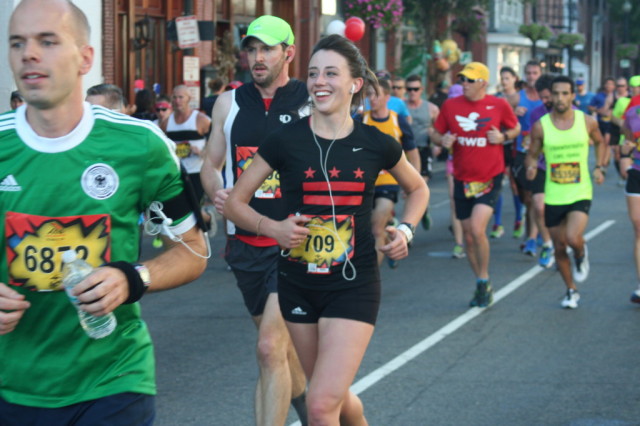
While many loved the scenic course, crowd support, and near perfect weather, runners at Sunday’s Marine Corps Marathon universally raved about one thing: Marine volunteers who motivated them to cross the finish line.
“The Marines are amazing,” said Addie Thompson, a 24-year-old D.C. resident. “It’s really cool to see them supporting on the sidelines and everyone is so kind at this race, I’ve never experienced a race crew that was just to kind and helpful and supportive.”
[button-red url=”http://www.marinemarathon.com/Results/MCM_Results.htm” target=”_self” position=”left”] Results [/button-red]Thompson, who finished in under four hours, works out with November Project D.C., a group that promotes free fitness with workouts – including running the Lincoln monument stairs – all before the sun comes up. She credits her training with the group, and support from fellow group members along the course, for the improvement over her 2013 time at the race.
“I personally had a much better race,” she said. “Honestly NP has done so much for my training and the crowd, people were just planted all over and incredibly supportive. We have a really tight crew.”
Megan Clark, 34, also really thrived on the energy from those on the sidelines, saying the support from the crowd is what helped her hit her time goal at her first marathon.
“It was good, it was tough, but I think it went really well. It felt good on energy from the people,” she said. “Wonderful crowd support.”
The D.C. resident had hoped to finish in under 3:45, and ended up crossing the finish line in 3:42. While many spoke about the beautiful course passing by historic monuments, Clark said her favorite part of the course was getting Dunkin Donuts munchkins at mile 24.
While her first race was a success, Clark wasn’t sure if there’ll be another 26.2 in her future immediately after finishing.
“It’s too soon to ask. Everybody says wait until later today. Right now everything hurts.”
Whittney Hollingsworth, 50, struggled with hills at the start, saying that while she expected some hills, she wasn’t prepared enough for elevation changes at the beginning.
“I hurt from the beginning,” she said. “It wasn’t the time I was shooting for, but there was no disappointment in the time at all. I was just glad to get to that finish line.”
The 7-time marathoner from Elkmont, Ala., had a three-marathon bucket list: the New York Marathon, the Boston Marathon and the Marine Corps Marathon. With Sunday’s finish, she finally has completed all three and said each exceeded her expectations. Her family, who waited for her at the finish line, said the Marine Corps was the best for spectators, and Hollingsworth commented on the helpful volunteers, saying that “the Marines were wonderful.”
Paula Dubovoy, 23, broke four hours at her second marathon, where she ran for World Vision, a nonprofit that raises money to build wells for those who may not have access to clean water.
“What I love about them is they motivate people here to stay in shape and to achieve something that someone may think they would never be able to do but then there’s a greater purpose behind it as well,” the Westborough, Mass.-resident said.
Her favorite part of the course was the Marine volunteers at water stops and along the course cheering her on, while she could thank them for their service as well.
“It was just really neat seeing all the Marines and them cheering for us and thanking us and then being able to thank them as well. It’s just a cool thing, they’re thanking us and we’re thanking them,” she said.
Darjush Boushehri expected a mediocre performance, as his marathon training took a back seat to his final semester finishing up his J.D. at George Washington University. Despite that, the 33-year-old Greenbelt resident was happy with his performance at his second Marine Corps Marathon.
“My training had gone really downhill with grad school for the last month and a half, so I just decided I would stick with one of the pacing groups, 3:25. It was a hope and a dream and I came in at 3:26. That is my personal best by 22 minutes on this course,” he said. “So surprisingly well.”
He first ran the race in 2011 and came back because of the great organization and scenic course that winds by the Kennedy Center, one of his favorite parts of the course.
“It’s extremely well put together,” he said. “It’s great how it’s fairly flat overall. It has a little bit of hills to give you a little change, and seeing all the monuments of course.”
Boushehri ran Sunday for Teens Run D.C., a running group that pairs inner city kids who are interested in running any race distance with an adult mentor.
“It helps to keep them accountable, keep them in shape and give them something else to do,” he said.
He doesn’t any other races coming up before he graduates in December, but is working toward the Shamrock Whale Challenge in March, where he plans to run a 5 miler and a marathon on consecutive days, and will compete at Ironman Cozumel later in 2015.
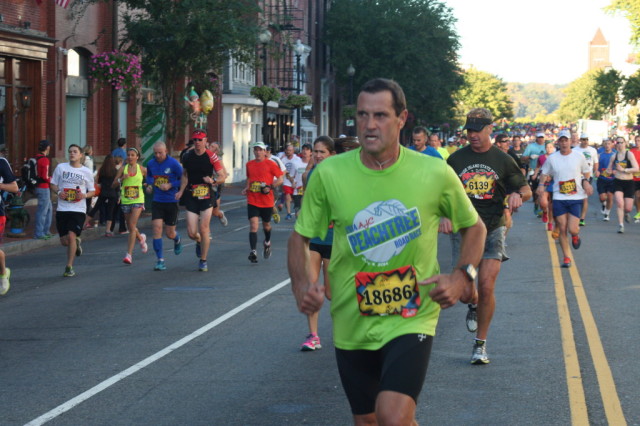
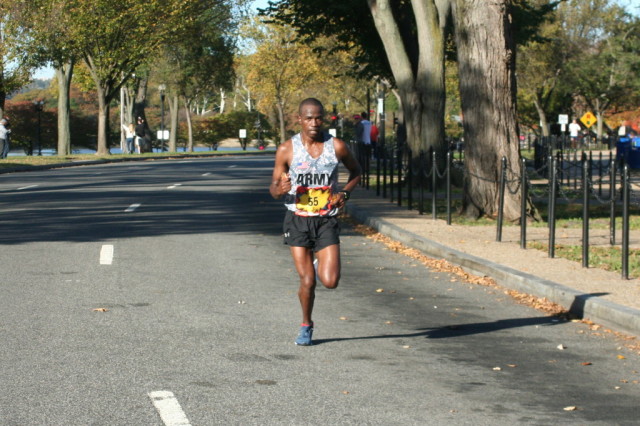
Amid the museums that line the National Mall, Spc. Samuel Kosgei and Capt. Meghan Curran carved out their place in history when they both took leads in the Marine Corps Marathon that they would hold to the finish. Along the way, they both led their respective U.S. Army teams to military marathon team championships.
[button-red url=”http://www.marinemarathon.com/Results/MCM_Results.htm” target=”_self” position=”left”] Results [/button-red]Both races featured strong leads by front runners in the first half. Getachew Asfaw and Colleen Little tried to run away with the race. Little faded after the half and six women were within 70 seconds at mile 17. Curran passed Little in mile 18 but soon found herself facing a daunting 20th and 21st miles crossing the 14th Street Bridge into Crystal City. Little went on to finish in 27th in 3:10:13.
But help arrived, she said. “A group of Marine Corps team runners told me to tuck in with them and they helped me get over the bridge,” where winds out of the north were starting to wreck havoc with the last segment of many runners’ races.
“The last few miles were really hard, because it was new it me, it was windy, but knowing I was on a team helped me push myself,” she said. “I was just taking it one mile at a timer after 20.”
She grew up in Chelmsford, Mass. And ran cross country and track at West Point, but said she has, comparatively, taken her running in a more recreational perspective as she’s settled into her job as a field artillery officer at Fort Dix in Moorestown, N.J. At 28, she, in a way, sprinted to her first marathon. After running the Army Ten-Miler two weeks prior, she caught the eye of Lt. Col. Liam Collins, the All-Army team captain, who had a few places on the roster to fill at Marine Corps. Collins ran 2:40:50.
“I knew she was a great runner, but I didn’t know she wanted to do a marathon,” he said. “Once I learned that, it was an easy decision to put her on the team. I told her the key thing was to be patient early on, don’t run too hard on the first 10 miles. There’s plenty of time to catch people when they fall apart.”
“I had been planning to do a marathon at some point, but I wasn’t planning for it to be this soon,” she said. “Col. Collins came up to me after Army and said ‘want to run a marathon in two weeks?’ It moved things up a little.”
Her longest run to that point had been 20 miles, and she admittedly had difficulties fueling. More of her last gel wound up on her leg than in her mouth.
“I was having a little trouble with my stomach, so I tried to take it a little at a time,” she said.
Kosgei emerged from Hains Point ready to make his move to catch Asfaw. Gutting into the lead with two 4:52 miles at 15 and 16, he was ready to take his shot.
“Our strategy was to win as a team, and we were going to do that by staying conservative early,” he said. “But we knew the fast guy would burn out, but we didn’t’ want to let him get too far ahead.”
Collins saw the race develop as he ran up Rock Creek Parkway as the leaders headed back south.
“I saw the leader so far ahead, but I was confident, I knew we were where we wanted to be,” he said. “They would catch him.”
Asfaw appears to have not finished the race.
A native of Uganda, Kosgei, 30, is stationed at Fort Riley in Junction City, Kan. where he is a medic. He has run the Twin Cities (where he set his 2:17:17 PR) and Houston marathons and ran track and cross country at Lamar University, where he was a two-time All-American.
“It’s a hard course, but a marathon is a marathon,” he said of Marine Corps. “If it’s flat you still feel it. My legs were heavy, the win was too much, but I knew I had to stay focused. The last mile wouldn’t kill me.”
He hopes to compete in the World Military Games in South Korea. In 2015.
Behind him, Army teammate Spc. Laban Sialo, 31, made his marathon debut, finishing second in 2:23:48. A medic stationed at Fort Carson in Colorado Springs, he was the 2012 indoor Division II champion in the 5k while at the University of Central Missouri.
“I wanted to get on the podium, so I could win a medal,” he said. “It’s a special thing to finish second in your first marathon.”
He focused his fall training on the Army Ten-Miler, and like Curran had not done specific marathon training, topping out at one 22-mile run.
“At first I thought I wouldn’t be able to walk again, but now I feel good,” he said.
Lindsay Wilkins, 36, matched her second place from her 2008 Marine Corps Marathon (2:49:06), and though she was a few minutes slower at 2:52:20, she felt it was a much better race for her. She lives in Arlington and ran track and cross country at the University of Richmond.
“In 2008 I lost by 11 seconds, so this was a lot better race,” she said. “A lot less frustrating, but it was hard at the end.”
She ran much of the race with intermittent training partner Erin Taylor, and the two moved up gradually throughout the race. The two were hoping to break 2:50, but like many runners, saw the wind blow those hopes away.
“I felt like someone was pulling me back the last four miles,” she said. “I know I said a few times, ‘you’ve got to be kidding me!’ There didn’t seem too many guys to tuck behind this year, so we were alone for a lot of it.
As was third-place woman Navy Lt. Gina Slaby, stationed in Virginia Beach, two weeks after running the Eindhoven Marathon in the Netherlands. The 33-year-old was last year’s runner up.
“It wasn’t where I wanted to be,” she said. “We got stuck in the middle of no-man’s land when the wind picked up.”
She ran with Kara Waters, of Great Falls, most of the race, and finished a second ahead of her, in 2:52:32. She’s headed to deployment in Djibouti, but is looking forward to racing a 100 miler in May or June, then the 2016 Olympic Marathon Trials.
Navy Petty Officer 2nd Class Justin Turner, PRed at his third Marine Corps Marathon, running 2:25:05. Not bad for a 35-year-old self-described “former obese smoker,” now stationed at Navy Base Coronado in San Diego.
“I just tried to stay patient, the leaders went out so fast. I sat back in 10th, but I knew people would start coming back to me,” he said. “They almost all did.
Arlington’s Mike Wardian was the first male master across the line, in fourth at 2:25:42 and Kristina Brendzel from Tampa led the 40+ women in 2:59:20 for eighth overall.
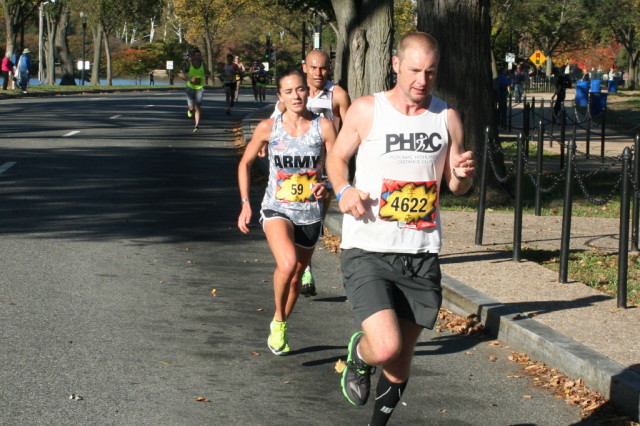
Marine Corps Marathon winners make moves on the Mall

Amid the museums that line the National Mall, Spc. Samuel Kosgei and Capt. Meghan Curran carved out their place in history when they both took leads in the Marine Corps Marathon that they would hold to the finish. Along the way, they both led their respective U.S. Army teams to military marathon team championships. Read more
Volunteers make the day for Marine Corps Marathon runners

While many loved the scenic course, crowd support, and near perfect weather, runners at Sunday’s Marine Corps Marathon universally raved about one thing: Marine volunteers who motivated them to cross the finish line. Read more
How’d They Do?

Run Washington featured six marathoners before and race and caught up with them afterward to reflect on their race experiences. Read on to learn about these runners and how they did. Read more
The Least Interesting Thing About George Banker?
He’s Running his 100th Marathon
Local running journalist, historian, competitor, race director and ambassador of the sport George Banker has been eyeing Marine Corps for his 100th marathon for some time. Read more
2013 Coverage
Shutdown Palace
Runners run, elected officials legislate and besides the dozens of honorary congressional chairman for the Cherry Blossom Ten Mile, never the twain shall meet.
Until October 2013. The first federal government shutdown in 17 years threw the running community into uncertainty as runners were ostensibly banned from National Parks Service property and race permits for that land disintegrated, putting the region’s marquee race in doubt. Read more
Men’s MCM winner holds lead for more than 25 miles
Wire-to-wire.
It almost has no place in any talk about a marathon, maybe only in a tall tale. The race is too long, too grueling, too open to disruption.
But Girma Bedada did it at the Marine Corps Marathon, running 2:21:31. Read more
Calway notches MCM title, Olympic Trials qualifier
With a strong lead in the Marine Corps Marathon, Army Capt. Kelly Calway had her opportunity–run harder now or spend seven months regretting it. With an impending deployment to Kuwait waiting for her a week later, the cool day in Washington was her chance to take care of qualifying for the U.S. Olympic Trials. Read more
Marine Corps midpackers find a lot to like
Much like Girma Bedada and Kelly Calway‘s efforts, Mike Kunzer‘s race at the Marine Corps Marathon was the culmination of years of preparation and training.
But Kunzer wasn’t focused on winning the race. He was thrilled to have finished, and it showed on his ebullient face. Read more

When Jenn Pellegrino starts the Marine Corps Marathon, her mind isn’t going to be on whether she can finish — she’s already done 24, three in the last month.
She also won’t be focusing on time. In fact, she’s making it a point not to rush through the race.
“It’s just such a special race,” she said. “You want to soak it up. I’m just going to run with some friends and have a good time.”
The Arlingtonian will be celebrating her 30th birthday, which is coming a few days after the race.
“I felt like there’s no better way to celebrate than to do what I love,” she said.
And she certainly loves running. Those 24 marathon finishes all came in the last three years, since running Marine Corps in 2011 because she was new to D.C. and “that’s what people do.”
Never mind that she was also signed up for Philadelphia, three weeks later.
“That was what started my training strategy,” she said. “If I keep running marathons, I don’t have to retrain myself to run them the next time. It sticks with me.”
In April, she did her first two-day double — the Garmin Marathon in Olathe, Kan. And the New Jersey Marathon in Long Branch. The first went well. The second…
“I wanted to get through a few miles and see how I felt,” she said. “It got worse and worse.”
She’s joined the Marathon Maniacs running confederacy and dates a follow frequent marathoner, Chuck Engle.
“I love that no matter where you go, in a huge race with thousands of people, you have this community,” she said of the Maniacs. “There are days where I’ll be talking to another Maniac during the week and by the end of the conversation I’m buying a plane ticket and registering for a race that weekend.”
That wasn’t always her.
“When I was younger, I wasn’t athletic at all,” she said. “It started later, after college, and I did the normal progression — 5k, 10k, half marathon.”
Her mom was the runner in the family, with young Jenn tagging along on her bike. But Susan Pellegrino never ran a marathon. Until last year. The two ran Marine Corps together. Mom still talks about the race.
“She called me the other day and she ‘it’s almost the one year anniversary of our marathon,’” Jenn Pellegrino said. “She would go for 15-miles runs and then hop on the bike, so I knew she could do it.”
To pin a label on George Banker, you’d have to get him to slow down first.
He’s a runner, an organizer, a historian, a photographer, a speaker, a joker, a mentor, a problem solver, and whatever else anyone needs him to be.
But as Oct. 26 approaches, Banker is first and foremost a marathoner. The 64-year-old will run his 30th Marine Corps Marathon, and his hundredth marathon, overall.
“Is it a passion? Yes, it is,” he said. “If you want something bad enough, you will do whatever it takes to get it done.”
You’ve seen him: tall, a lean runner’s build, short hair, notepad in hand and camera around his neck.
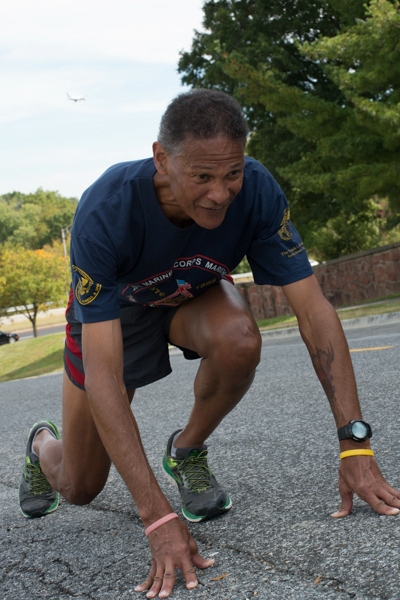
He grew up on the Quantico Marine Corps, the son of two Marines and the stepson of another. He went on to serve 20 years as a tech sergeant in the U.S. Air Force, eight in active duty from 1969 to 1977, which included service in Vietnam. While spending 12 years in the Air National Guard based in Washington, D.C., he studied accounting at George Washington University, began working for IBM. He worked at IBM for 25 years, while raising children Ronald, Yvette and Dre with his wife, Bernadette. They’ve been married for 43 years.
Banker’s military upbringing and career shaped his outlook. “There is just a bond that the military has that is very difficult to duplicate in civilian life,” he said.
His name is synonymous with the area’s military-sponsored races. His job as operations manager for the Army Ten-Miler “pays the bills,” but he also serves as the MCM historian and in an unofficial capacity on the board of many other local D.C. races, including the Navy-Air Force Half Marathon, the George Washington Parkway Classic and the Lawyers Have Heart 10k.
At other races, he works as an announcer and provides general support and troubleshooting to race directors.
Martha Merz, an elite masters runner and Navy spouse who has lived in the D.C. area on an off for the past 25 years, has known George since she began racing here after college. “He is the professional behind the scenes at so many races, getting things done and ensuring that race organizers understand runners and all the intricate details that go into a quality event,” she said.
Writing race recaps for the Rock Creek Running Club in 1984 gave him his start in running journalism and he was hooked when he saw his byline in Runner’s Gazette. For the next decade, Banker covered about 60 races per year, sometimes running in them, too. He followed the lead of Jim Hage and Steve Nearman, then developed his own style, becoming a race reporter for the masses.
“I would talk to anyone and everyone – front, middle, and back of the pack,” he said. “Every race has a soul. But it takes the right person to write about it.”
Documenting MCM’s history, from its debut back in 1976, was one of his passions.
Those Runner’s Gazettes, along with seemingly every other running artifact he has collected, are neatly filed in boxes that basically insulate the basement of his home in Fort Washington, Md.
“I’m an organized pack rat,” he said. “When I die, there’s going to be a U-Haul in the funeral procession, behind the hearse.”
Those records helped Banker assemble The Marine Corps Marathon: A Running Tradition, published in 2008.
“This book was a labor of love, an ego trip,” he said. “I wanted my name on the front cover and my picture on the back. I don’t track sales; I don’t go buy a truckload of books and park out by the Metro.”
But writing the book was important to him, for the simple reason that he is the only one with as much knowledge on the history of the “people’s marathon.”
“He is the people,” said MCM race director Rick Nealis. “I can’t think of another individual in the D.C. area who does what he does for the sport of running. And from a historian’s standpoint, he’s been invaluable.”
Nealis appreciates that Banker has been able to cross “party lines” by being a uniting force among race directors, race organizations and sponsors… even different branches of the military. “He is the definition of ‘joint,’ or purple, as we call it [in the military],” Nealis said.
His ATM duties include the role of community outreach director. He also sees himself as an advocate for runners. “I’m looking out for that runner, because no one else is going to,” he said. “I may be bumping heads with the race director on some of my decisions, but frankly speaking, that’s my job.”
He’s not shy about getting an elite runner into a race to help boost the quality of the fields. “I look at this as a way to validate everything these elite runners have been doing,” he said. “And I’m going to bring in some talent to race with them.”
But Banker also welcomes talent to races for other reasons: the great stories that emerge. He seeks to tell not just the running story, but the personal side, too. He has learned that writing about what makes runners tick, and how they balance the running, the personal, and the family side of things, is what people want to read – not just race results.
Masters ace and Potomac River Running owner Ray Pugsley, who won the masters title at the 2013 ATM, said in September that Banker was urging him to defend his title, despite recent back surgery. Pugsley had recovered, but had not quite fully regained his fitness.
“He’s relentless,” Pugsley said.
Pugsley has known Banker for 20 years. He remembers seeing George at the finish line of every race with a smile on his face, hoping to interview the finishers.
“He knew our names, he knew about us, about races we had run, about who we were,” he said. “And in turn, we started to get to know George — not just as a reporter, but as a friend.”
Throughout his many dedicated years of service to the sport, Banker has managed to keep up his own racing. Running well before dawn has always been routine, given his schedule.
His fastest marathon is a 3:04:37, run in Houston in 1988. Nowadays, Banker is happy just to finish, injury-free.
He has targeted Marine Corps for number 100 for some time, but ice on the George Washington Birthday Marathon course, which forced its cancellation in February, meant he had to improvise and run the Elkton Trail Marathon in Maryland to catch up and stay on pace. It did not go well.
“It was one of those races where I had to tell myself to stop looking at my watch,” he said. “I have some unfinished business there.”
In addition to running his hundredth marathon at MCM, he also plans to run his seventh JFK 50 Mile on November 22. He wants the sweatshirt given to runners who have finished 10 JFKs.
Banker has been “the heart and soul of military-related running in the region for decades,” said Race Director Mike Spinnler.
Banker has long been advised by Joe Lugiano of Cary, N.C. Banker thinks of Lugiano as more than a coach, but someone who embodies what running means to him.
“He has been my coach back to IBM days and I have known him since I have been running,” Banker said. “We all have that person who knows your body and what you can do. He trains [me] by using my confidence in my abilities.”
In his own coaching, Banker takes a demanding yet realistic approach.
“I will get inside your head; I want you to make a commitment. Take a look at your schedule. How much time do you have to devote? That’s how much time you give. You need to get out of it what you want.”
Local runner Elyse Braner met Banker several years ago. “He took me under his wing and quickly became of my most important mentors and role models,” she said. “Many others can say the same of George. His commitment to volunteerism and the community is nearly unequaled. On top of all of this, he finds the time to train for marathons and ultra-marathons. I only hope that one day I can have even a fraction of the impact on the community that George has had.”
Chief Running Officer of Runner’s World Bart Yasso first met Banker at a convention nearly three decades ago.
He described Banker as a “dear friend,” and as someone who does a “bundle of everything for the sport.” Yasso was particularly impressed, though, by Banker’s efforts to promote diversity in running.
“He had so much insight on the future of the sport … and he’s really had an impact in that way,” he said.
I’m no expert on the Marine Corps Marathon, but after running it (almost) twice and spectating five times, I have a few insights to offer on getting around, seeing people you want to see and getting them the encouragement they need.
First off, it’s a good idea to sign up for runner tracking. Though it may not always offer instant updates, it’s a good way to keep an eye on where people are at 10k, 20k, 30k, 40k and the finish.
The Metro can help you get around, if you time it right. The system opens at 5 a.m. and there have some additional trains running on the Blue Line between Franconia-Springfield and Stadium-Armory between 5 a.m. and 8:15 a.m. and 11:30 a.m. and 4:30 p.m.
That said, it’s a good idea to think about when you’ll be trying to get from, say, the Smithsonian or L’Enfant Plaza stations to Crystal City, because as fast as the Metro may move, hitting it at the wrong time could mean a runner can move two miles faster. Check out WMATA’s trip planner tool. Make sure you have enough money loaded on your SmartTrip card so you can breeze through the toll gates. And don’t overshoot your stop.
For marathon viewing novices, it can be really hard to pick people out early in the race, so give the runners a few miles to get out of the crowd and spread out.
The less crowded the sidelines, the more runners will appreciate cheers. People write their names on their shirts because they’re inviting you to cheer those names, and it helps to hear your name called in a tough race.
Here are a few nuggets I’ve picked up from my Marine Corps spectating, and racing, experience:
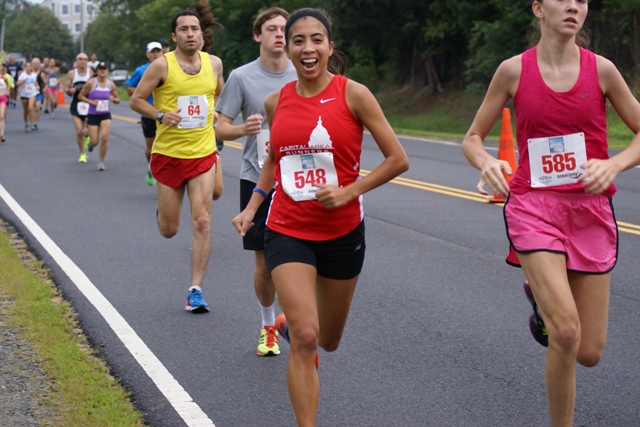
It was time, and Kelly Swain knew it.
“I was always working up to a marathon,” she said just a month before toeing the line at the Marine Corps Marathon.
The 29-year-old Burke native has been running since high school, but wanted to wait for the right moment to commit to 26.2 miles. She started running while at Lake Braddock, encouraged by her older sister’s achievements, but quickly became successful in her own right. That sister, accomplished local runner Erin Taylor, recalls “some middle school race, or high school, [Kelly] either won the mile or got second. I was like, ‘People think I’m fast? She’s gonna be way faster.”
Swain went on to run at the University of Virginia, but injuries and the pressures of collegiate running kept her from the “normal college experience” she wanted, the kind where your peers aren’t working like professional runners to maintain their scholarships. She declared herself retired.
“I just needed a break and didn’t think I really liked running any more,” she said.
She’s not alone.
“A lot of these runners come out of college programs burnt out,” said George Buckheit, Swain’s coach with Capital Area Runners. “They just feel like running isn’t fun, and I think one of the strengths of what we put together at Capital Area Runners is we’ve got a group that is very supportive.” This has been a selling point for Swain’s return; both sisters praise Buckheit and their teammates for the motivational atmosphere that sets them up for their success.
“The Ultimate Progression”
“When I came back to running three years ago, I promised myself I would not let it consume my entire life,” Swain said.
Instead of cutthroat competition, she made the choice to set time goals and encourage runners who might pass her.
“I think when I took the focus off of competing with other runners and placed it on my own ability, I started loving running once again,” she said.
Still, to her, the marathon was “the ultimate progression” in a runner’s career and her unspoken goal was to finish her first in under three hours. To get there, she spent two years rebuilding her base with CAR and the last year racing the Army Ten-Miler, the Richmond Half Marathon, and most recently, the Navy-Air Force Half Marathon. Her times show little hint of having recently come out of retirement. In fact, she won the Marine Corps 17.75k in March and placed fifth at the Navy-Air Force Half-Marathon. But she had to rebuild her confidence alongside her mileage before she considered going farther.
“I didn’t want to just do a marathon to do it,” she said. “I wanted to do a marathon to know that I was going to run well and that I was well prepared.” Doing well, for her, meant being thoroughly prepared to break three hours. “I guess this is the year that I thought I was ready to do that,” she said, with characteristic humility. Because runners love a challenge, she also scheduled her wedding to to fiancee, Brendan Mahoney, for Nov. 1, 2014, just six days after her marathon.
With any luck, the post-race soreness will wear off before it’s time to dance.
“I never make any bold predictions on a race, especially a marathon,” Buckheit said of her upcoming race. “It’s so unpredictable. But she’s running great. This is as well as she’s been running since she’s been with us.”
Swain is also running her highest mileage ever, and without injury, which Buckheit attributes to better recovery practices.
“She’s ready,” Taylor said. “She knows how hard a first marathon can be, especially if you go out too fast like I tend to do and then you’re pretty much crawling in. She’ll run better than I did my first.”
Taylor’s pride in her sister shines through every praising word she said. “That week is going to be amazing for her,” she gushed.
Race Day
On marathon morning, Swain plans to heed the advice of her coach to start slow and finish fast. She attributes her success at the Navy-Air Force race to staying slow through the first 5k, per Buckheit’s advice. “I never believed him at first until I actually started to do it in races,” she said.
Buckheit and Taylor shared their advice for Swain, the thing they’d like to repeat in her ear for 26.2 miles.
Taylor said to have fun. “At the end of the day, there’s gonna be some part of the race I would think [will] hurt worse than anything that’s ever hurt before, and just to remember you’re doing this because it’s fun.”
And Buckheit reiterated the need to be patient. In the first 10k, he said, “If you don’t feel like you’re running too slow, you’re running too fast. […] Wait until everyone else has made their early race mistakes and starts crashing, and that’s when you pick your spot to start moving your way through the field.”
Most of all, they share the unequivocal opinion that she is ready. She has trained hard and run well throughout her training. All that remains is to race.
“We’re rooting for her,” her sister said.
This article originally appeared in the November/December 2014 RunWashington.

Through the throngs of spectators lining the Marine Corps Marathon course, Marine Maj. Anthony Garofano will have his ears open. Underneath the canopy of cheers, he’ll listen for an unmistakable sound.
“At certain points, she’ll be out there and, if she’s crying, she’ll be easy to hear,” Garofano said of his newborn daughter, Helen.
While training for his first marathon, Garofano fit in runs around a demanding schedule as an active duty judge advocate general for the Marine Corps, his commitment to organize a running club for Capitol Hill staffers and preparing to be a new dad.
In spite of all that, everything went pretty smoothly, thanks to his understanding wife, Christine, and co-workers.
“My office has been incredibly supportive the whole time and there’s only one run that I went on with my cell phone in my hand just in case I needed to stop early,” he said. “Otherwise it’s been very smooth. My runs are early enough that Chris doesn’t even know I’m going.”
Garofano was commissioned as a Marine Corps officer in 2004 and began serving as an active-duty service member in 2008. Through his job, Garofano ended up in charge of the Capitol Hill Running Club this year. During training season for the Marine Corps Marathon, the Marine Corps liaison office organizes the club, setting up a training plan for the race, water stops and support for the weekly long runs. Since he was coordinating training for a group of 20 to 30 Hill staffers, he figured this would be a good year to tackle the marathon himself.
“It was sort of in the back of my head — I don’t want to, but I (also do) want to run a marathon — so taking on this club was the opportunity,” he said.
The group meets Tuesday and Thursday mornings, with a long run on Saturdays.
“That doesn’t interfere with work schedule, but it ruins your Friday night a little bit,” he said. “(But) when you’re 32 and you have a baby, there’s not much Friday night left to ruin.”
Luckily, his wife understands the demands of both the club and marathon training.
“I’m really lucky to have a wife who’s so understanding about the commitment to the running and the club and who’s healthy enough to not have an issue,” he said. “This could be a lot more difficult without people being supportive.”
In addition to his time working as a fellow for Rep. Darrell Issa (R-Calif.), whose district includes Marine base Camp Pendleton, Garofano has also served as a military prosecutor and a battalion judge advocate who deployed with the 1st Light Armored Reconnaissance Battalion to southern Helmand Province, Afghanistan in 2010. While overseas, he helped the troops handle legal matters, like rules of engagement or dealing with detainees. Now, he works in the Marine Corps House liaison office, educating and informing members of Congress about the Marine Corps.
He’s had some training interruptions —missing his 18.5-mile long run the day his wife went into labor in late August, and a week to adjust to Helen’s sleeping schedule. He had to miss a few runs when traveling where it was unsafe to run, but wasn’t worried about it affecting his overall training. The weeks he’s had to miss long runs, he said he’s felt just as strong going farther the next week.
“If I missed several weeks in a row, then I’d be concerned, but missing one or two long runs doesn’t fill me with terror,” he said. “Maybe that’s ignorance.”
His travels have given him a few unforgettable runs all around the world. One of his favorites was during a trip to Guam, where he got to run along the beach. And another run in Hanoi, Vietnam, which was so humid that his watch face fogged up as soon as he stepped out of his hotel.
“It was about 6:30 in the morning; it was like the entire city was outside exercising, whether it be Tai Chi or playing badminton, or there was a muscle beach set up, with guys doing bench press and sit ups,” he said. “It was really cool to see so many people outside exercising at the same time, it was a neat community spirit thing.”
Garofano has spent years running, but is tackling long distances for the first time. He was a sprinter at Middlebury College in Vermont. Since then, he’s mostly lifted weights, gone on multi-day hikes and run just enough to pass the annual physical fitness test for the Marines.
“Every year the Marine Corps makes you run three miles to make sure you’re still in shape; that was the standard for me prior to this year,” he said.
As a result, every week’s long run is a new milestone as the farthest he’s ever run in his life.
“A lot of it has been mental,” he said. “I’ve gotten to the point if I can do 17.5 miles, I figure as long as I can keep it up I can suffer through 26.”Although Garofano has managed to fit almost everything into his weeks, one thing that has suffered has been spending time with friends, though he said they’re all understanding of the time spent running and with his new daughter.
“My friends and Chris’ friends may think we’ve abandoned them, but I think we’ve got a pretty good excuse,” he said. “The combination of running and baby has certainly reduced the amount of going out to dinner, but everyone understands.”
This article originally appeared in the November/December 2014 RunWashington.


